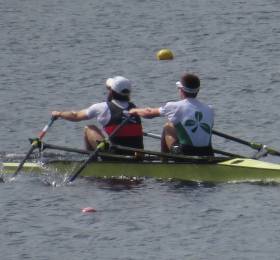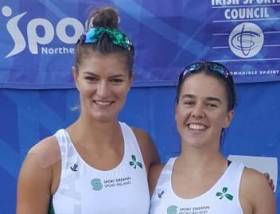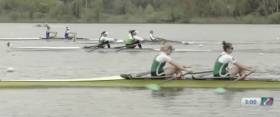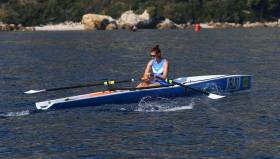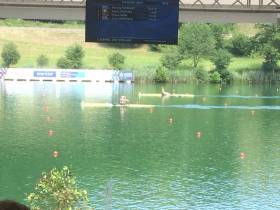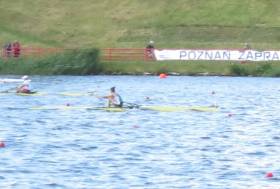Displaying items by tag: Dukarska
Ireland Crews Weather Storm and Stay on Course
#Rowing: Paul O'Donovan and Fintan McCarthy hit the right mark in their first competitive race as the new Ireland lightweight double. At the World Cup Regatta in Rotterdam, they finished .39 seconds ahead of Australia in their time trial and qualified directly for the semi-finals.
The heats were run on a time trial basis as the regatta was buffeted by a storm and racing had to be delayed and the programme altered.
All six Ireland crews made it straight through in the changed system. The Ireland men's double of Philip Doyle and Ronan Byrne posted the best time in their heat, just ahead of Switzerland, who also qualified.
Aileen Crowley and Monika Dukarska also made it straight through. The Ireland pair finished second in their time trial to the outstanding New Zealand crew of Kerri Gowler and Grace Prendergast.
Jake McCarthy and Gary O'Donovan both qualified from their heats of the lightweight single sculls. McCarthy took second and O'Donovan third.
The one Irish crew which fell outside automatic qualification was the lightweight women's double of Lydia Heaphy and Denise Walsh. They finished fourth, but made it through as one of the fastest losers.
Crowley and Dukarska Miss Out at World Championships
#Rowing: Ireland’s Monika Dukarska and Aileen Crowley finished fifth in their repechage and missed out on the A/B semi-finals of the double sculls at the World Rowing Championships in Plovdiv, Bulgaria. The race featured a very close finish, with the Czech Republic overtaking the long-time leaders, Germany, on the line while Poland pulled out an outstanding sprint to take the crucial third place away from Chile. Ireland will go to the C/D semi-finals.
World Rowing Championships, Plovdiv, Bulgaria, Day Four (Irish interest)
Men
Lightweight Quadruple Sculls – Repechage One (First Two to A Final): 1 Turkey 5:51.12, 2 Ireland (F McCarthy, R Ballantine, J McCarthy, A Goff) 5:54.09
Women
Double Sculls – Repechage Three (First Three to A/B Semi-Finals): 1 Czech Republic 7:00.07, 2 Germany 7:00.30, 3 Poland 7:00.48; 5 Ireland (M Dukarska, A Crowley) 7:03.48
Puspure and Dukarska Team Up to Take Sculling Bronze
#Rowing: Sanita Puspure and Monika Dukarska teamed up in a double to take a bronze medal at the Memorial Paolo d’Aloja in Italy today. The Ireland crew led early on and stayed in the mix as Lithuania took over the lead. In a dash for the line, Ireland and South Africa fought it out for silver, with the South Africans just taking it.
Ireland had earlier taken a medal in the single sculls through Emily Hegarty, who also took bronze.
Memorial Paolo d’Aloja International Regatta, Piediluco, Italy (Irish interest)
Sunday
Women
Double Sculls – A Final: 1 Lithuania 7:07.04, 2 South Africa 7:09.36, 3 Ireland (S Puspure, M Dukarska) 7:09.88.
Single Sculls – A Final: 1 Ukraine (D Dymchenko) 7:52.35, 2 Lithuania (L Saltyte) 8:11.90, 3 Ireland (E Hegarty) 8:14.76.
Crowley and Dukarska Win in Double in Italy
#Rowing: Ireland’s Monika Dukarska and Aileen Crowley took gold at the Memorial Paolo d’Aloja regatta in Piediluco in Italy this morning. The new double proved better than two Italian crews in a three-boat final. Sanita Puspure had to settle for silver in the women’s single, losing out to Diana Dymchenko of the Ukraine, while the women’s pair of Aifric Keogh and Emily Hegarty finished fifth in their six-boat final.
Memorial Paolo d’Aloja International Regatta, Piediluco, Italy (Irish interest)
Women
Pair – A Final: 5 Ireland (A Keogh, E Hegarty) 7:45.96.
Double Sculls – Final: 1 Ireland (M Dukarska, A Crowley) 7:13.93.
Single Sculls – A Final: 1 Ukraine (D Dymchenko) 7:38.04, 2 Ireland (S Puspure) 7:38.55, 3 Lithuania (M Valciukaite) 7:41.88.
Snow Strands Dukarska at National Rowing Centre
#Rowing: Monika Dukarska and coach David McKenzie McGowan have been snowbound at the National Rowing Centre for four days. The Ireland international trained on the lake on Wednesday but her car has been snowed in and she sees little chance of leaving the woodland venue until there is a thaw. The venue has multiple sleeping quarters and both have water, food and electricity – but they are short of bread. They scratched out a plea in the snow in the front of the boathouse.
World Champion Imperious at Irish Rowing Trial
#Rowing: Paul O’Donovan was by far the fastest single sculler at the Irish Trial, held over six kilometres at the National Rowing Centre today. The conditions at this point were excellent, and the world lightweight champion clocked 23 minutes 25 seconds, 42 seconds ahead of his brother, Gary, who took third. Second place was taken by Ronan Byrne, the under-23 heavyweight. Shane O’Driscoll and Mark O’Donovan did not compete through illness and injury.
Monika Dukarska was the fastest woman in the single sculls – Sanita Puspure did not compete. The Ireland crew of Aileen Crowley and Aifric Keogh took first pace in the pair – but had only three seconds to spare over Tara Hanlon and Emily Hegarty. The Fermoy junior pair of Eliza O’Reilly and Gill McGirr showed good form to take third.
Conditions changed at the end of the session.
Irish Trial, National Rowing Centre (Selected Results)
Men
Pair: 1 Shandon (Murphy, Prendergast; sen) 23 mins, 39 sec, 2 St Michael’s (McKeon, Garvey; under-23) 24:02, 3 Neptune (Hogan, Stevens) 24:20. Junior 18: Castleconnell (Mulready, O’Donovan) 24:37.
Single Sculls: 1 P O’Donovan (lightweight) 23 mins 25 seconds, 2 R Byrne (u23 hwt) 23:46, 2 G O’Donovan (lwt) 24:07, 4 J McCarthy (u23 lwt) 24:09, 5 S McKeown (hwt) 24:12, 6 Justin Ryan (hwt) 24:17.
Women
Pair: 1 A Crowley, A Keogh (hwt) 24:51, 2 E Hegarty, T Hanlon (hwt) 24:54, 3 E O’Reilly, G McGirr (jun) 25:49
Single Sculls: 1 M Dukarska (hwt) 25:04, 2 D Walsh (lwt) 25:28, 3 A Casey (u23 lwt) 26:04, 4 C Lambe (hwt) 26:18.
Dukarska Wins Heat at World Coastal Rowing Championships
#Rowing: Monika Dukarska won her heat at the World Coastal Rowing Championships in Thonon in France this morning. She qualified for Saturday’s A Final of the Coastal Women’s Solo. Two other Ireland competitors, Jessica Lee of Killorglin and Jeanne O’Gorman of Arklow, will compete in the B Final after placing 13th and 16th respectively.
The women’s coxed quadruple from Castletownbere finished ninth in their heat and made the A Final, while Cairndhu and Courtmacsherry will compete in a B Final. They finished 12th and 13th in their heat.
The Galley Flash men’s double of David Duggan and Mark O’Brien finished 11th in their heat and go to the B Final.
Dukarska is the defending champion in the women’s solo.
World Coastal Rowing Championships, Thonon, France, Day One (Selected Results; Irish interest)
Men
Double – Heats (First Seven to A Final; 8 to 13 to B Final) Heat Two: 11 Galley Flash.
Single – Heats (First Seven to A Final; 8 to 13 to B Final): Heat One: 6 Castletownbere (A Sullivan-Greene), 7 Arklow (J Casey). Heat Two: 10 Galley Flash (B Hooper). Heat Three: 7 Bantry (A Hurley); 8 Arklow (A Goodison)
Women
Quadruple, Coxed – Heats (First 10 to A Final; rest to B Final) Heat One: 12 Cairndhu, 13 Courtmacsherry. Heat Two: 9 Castletownbere; 13 Galley Flash.
Double – Heats (First 10 to A Final; rest to B Final) Heat One : 14 Arklow
Solo – Heats (First 10 to A Final; rest to B Final) Heat One: 1 Killorglin (M Dukarska) 20 min 44.83 sec; 13 Killorglin (J Lee); 16 Arklow (J O’Gorman). Heat Two: 10 Arklow (S Healy); 16 Arklow (V Annesley).
#Rowing: Both of Ireland’s competitors made the semi-finals of the women’s single sculls at the World Cup in Lucerne. Sanita Puspure won her quarter-final, while Monika Dukarska took a comfortable third in hers.
Puspure had tough opponents. She battled it out with Felice Mueller of the United States and Ekaterina Karsten of Belarus throughout. They moved away from the rest of the field and though all three were all but guaranteed to take the qualification places, Puspure finished impressively to win.
Dukarska’s third was a clear one. Again, three women broke free. Carling Zeeman took over to win, with Annekatrin Thiele of Germany second and Dukarska not far behind – over 11 seconds clear of Eeva Karppinen of Finland in fourth.
World Cup Regatta, Lucerne, Day One (Irish interest)
Men
Lightweight Pair – Exhibition Race: 1 Britain (J Cassells, S Scrimgeour) 6:57.32, 2 Ireland (M O’Donovan, S O’Driscoll) 6:59.26, 3 Brazil 6:59.29.
Lightweight Double Sculls (First Two to A/B Semi-Finals; rest to Repechage) – Heat One: 1 France 6:27.36, 2 Britain One 6:30.70. Heat Two: 1 Greece 6:25.88, 2 Czech Republic 6:26.39; 3 Ireland (G O’Donovan, P O’Donovan) 6:28.63. Heat Three: 1 Italy 6:29.15, 2 Belgium 6:32.44.
Women
Single Sculls (Three to Quarter-Finals; rest to quarters or E Final) – Heat Three: 1 Austria (M Lobnig) 7:46.97, 2 Ireland Two (M Dukarska) 7:51.44, 3 Latvia (E Gulbe) 8:02.20.
Heat Five: 1 Britain (V Thornley) 7:45.65, 2 Ireland One (S Puspure) 7:47.84, 3 Finland (E Karppinen) 7:58.04.
Quarter-Finals (First Three to A/B Semi-Finals): QF One: 1 Ireland (Puspure) 7:52.50, 2 United States (F Mueller) 7:53.39,
3 Belarus (E Karsten) 7:59.13.
QF Three: 1 Canada (C Zeeman) 7:57.04, 2 Germany (A Thiele) 8:01.51, 3 Ireland (Dukarska) 8:03.64.
Puspure and Dukarska Race into Lucerne Quarter-Finals
#Rowing: Monika Dukarska and Sanita Puspure both qualified for the quarter-finals of the women’s single sculls at the World Cup regatta in Lucerne today.
Dukarska drew Magdalena Lobnig, the holder of the world’s best time in the event, in her heat. The Killorglin woman stuck with the Austrian as others let her go and finished second.
Puspure also took second in her heat, refusing to let Britain’s Victoria Thornley dominate the race. The two matched each other over the final stages, though both eased up coming to the line, with Thornley taking the victory by two seconds.
World Cup Regatta, Lucerne, Day One (Irish interest)
Women
Single Sculls (Three to Quarter-Finals; rest to quarters or E Final)
Heat Three: 1 Austria (M Lobnig) 7:46.97, 2 Ireland Two (M Dukarska) 7:51.44, 3 Latvia (E Gulbe) 8:02.20.
Heat Five: 1 Britain (V Thornley) 7:45.65, 2 Ireland One (S Puspure) 7:47.84, 3 Finland (E Karppinen) 7:58.04.
Dukarska Chosen in Ireland Team for Final World Cup
#Rowing: Monika Dukarska has been chosen to represent Ireland at the third World Cup Regatta in Lucerne early next month. The Killorglin woman finished ninth (third in the B Final) on her first foray as a single sculler at a World Cup event, in Poznan in Poland last weekend. She joins Sanita Puspure, who won the B Final in Poland. The Ireland lightweight pair of Shane O’Driscoll and Mark O’Donovan, who have taken gold in the previous two World Cups and in the European Championships will hope to continue their run. The lightweight double of Paul and Gary O’Donovan were silver medallists at the Europeans and in the World Cup in Poznan.


























